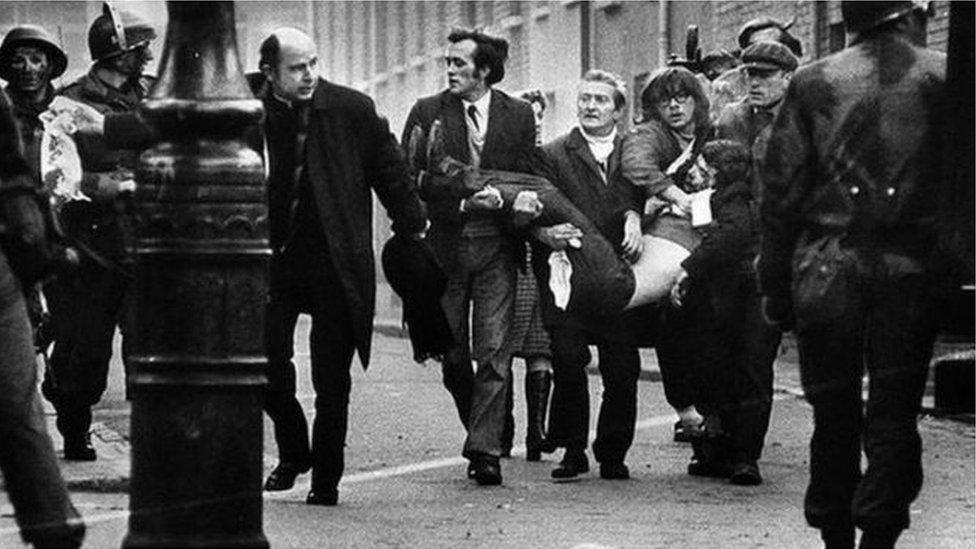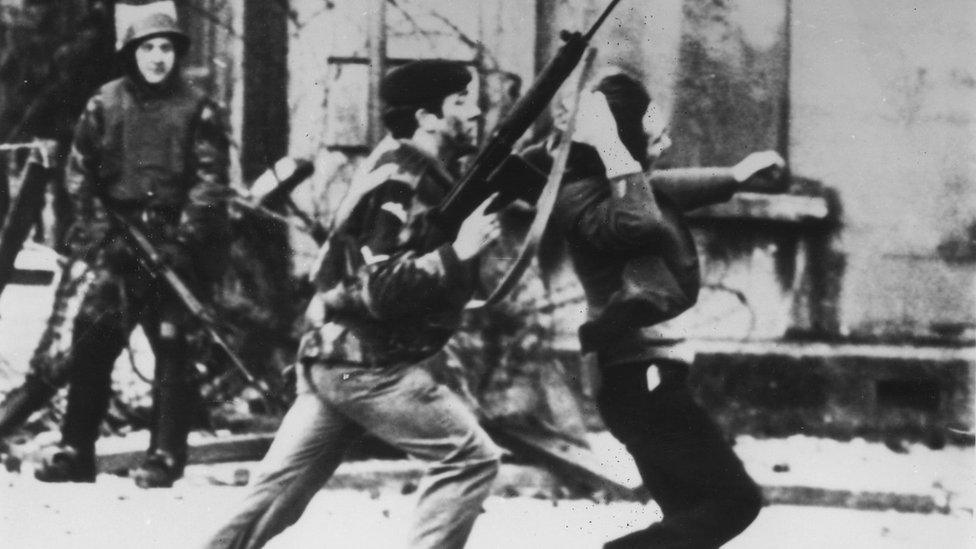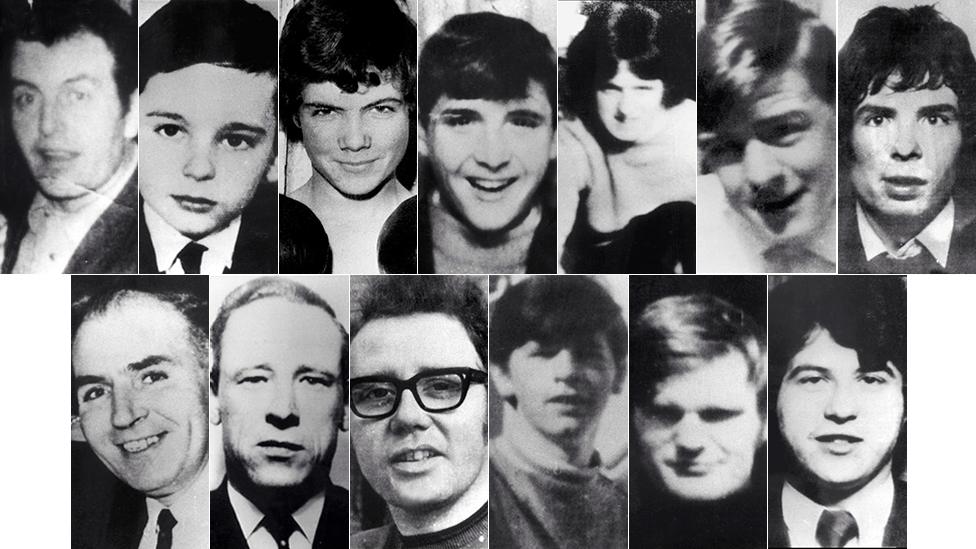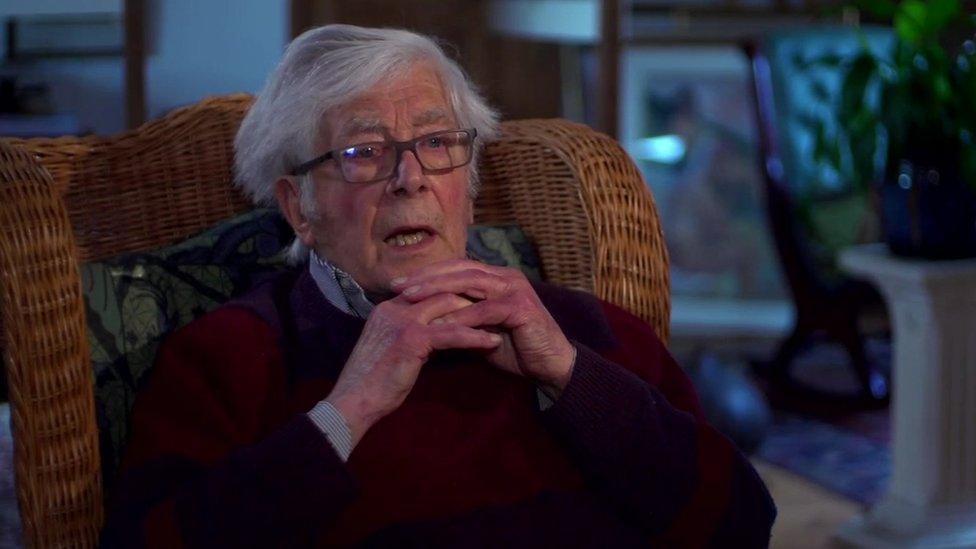Derek Wilford: Bloody Sunday commander dies
- Published
Lt Col Wilford: "We thought we were under attack"
The commander of the Parachute Regiment on Bloody Sunday, Lieutenant Colonel Derek Wilford, has died.
Thirteen people were shot dead in the Bogside on 30 January 1972 when the army opened fire on civil rights marchers.
Fourteen others were wounded that day in Londonderry; one later died.
Lt Col Derek Wilford, the officer directly in charge of the paratroopers, always maintained that his soldiers had been fired on first.
However, the Saville Report, which strongly criticised the Parachute Regiment, said Derek Wilford had ignored orders from his brigadier that he should not order troops beyond a barrier deeper into the Bogside area.
Lt Col Wilford OBE (Mil) died on Friday aged 90 after suffering from Parkinson's disease.

Thirteen people were shot dead by the Parachute Regiment on Bloody Sunday
Chairman of the Bloody Sunday Trust Tony Doherty, whose father was shot dead on Bloody Sunday, said his death, "while felt by his family", would not be mourned "by the families of the innocent men and boys whose lives were taken by armed British paratroopers on Bloody Sunday".
He told the BBC: "Colonel Wilford lived in a constant state of denial, never once accepting any measure of responsibility for his actions on that fateful day.
"History, though, will ensure that his actions led directly to the deaths of many innocent people which, in turn, led to years of conflict and hardship for our communities. He left a terrible legacy and will rightly be remembered for that."
Liam Wray, who lost his 22-year-old brother James on Bloody Sunday, said he was not surprised that Derek Wilford always stood by his soldiers and tried to justify their actions on that day.
Describing the Parachute Regiment as "brutal thugs", he added: "For his family, I understand there'll be sorrow. I take no delight in his death, but I'll not be shedding any tears either."
The veteran journalist, Peter Taylor, who interviewed Wilford several times, described him as a tough, outspoken and charismatic figure who was adored by his men, who he adored in turn.
"He told me in my last interview [in 2019], he would believe until his dying day that his soldiers were fired upon.
"There were some shots at the beginning of the march but they were not the shots that resulted in the, frankly, the sort of massacre of innocent marchers.
"Derek Wilford believed that because, in a way, he had to believe it. He believed his men would never be responsible for what they were being accused of doing.
"What actually happened on Bloody Sunday was that Derek Wilford lost charge of his men.
"The problem for Derek Wilford was that he could not accept that his men would be responsible for killing civilians, that number of civilians, in cold blood."
The DUP MP, Gregory Campbell, said people would have mixed views and feelings about Derek Wilford.
He said: "There will be some who will say he was quite right in what he said.
"There will be others who will dismiss him either as an irrelevance and a person who took massively wrong decisions but he was obviously a complicated character and people will judge him accordingly."
According to Lord Saville, who conducted a 12-year inquiry into Bloody Sunday, the battalion's Support Company was known for "using excessive physical violence".
Following internment without trial in August 1971, Wilford's battalion, along with others, was sent to deal with serious rioting in west Belfast's Ballymurphy estate, after the Army had arrested IRA suspects.
The operation ended with 10 people dead. It would take nearly half a century before a coroner would clear their names and describe all those who died as "entirely innocent" in May 2021.
Five months after Ballymurphy, Wilford's battalion was deployed to Derry to crack down on rioters, known to the Army as the 'Derry Young Hooligans'.

Soldiers on the ground in Derry in January 1972
The soldiers said they had come under attack and were returning fire.
Almost a decade after the Saville Report, Wilford was asked by journalist Peter Taylor if he accepted what the inquiry had said.
"No, I don't, because I was there," he said.
"We were under attack and we will actually remain convinced of that actually to the end of our days."

The victims, top row (l to r): Patrick Doherty, Gerald Donaghey, John Duddy, Hugh Gilmour, Michael Kelly, Michael McDaid and Kevin McElhinney. Bottom row : Bernard McGuigan, Gerard McKinney, William McKinney, William Nash, James Wray and John Young
Lord Saville was clear that the soldiers fired the first shots, wounding Damien Donaghey who, according to Lord Saville, was not posing any threat of death or injury.
'We were betrayed'
Bloody Sunday took its toll on Derek Wilford, who left the Army in 1983.
He blamed it for the collapse of his family and of his 22-year marriage.
Wilford re-married and set up an antiques business while continuing to enjoy painting and reading poetry, sporting a ponytail in later life.
But he also suffered ill health and had Parkinson's disease.
He stood by his men until the end and condemned the prosecution of soldiers.
"I don't believe they were capable of that sort of indiscriminate shooting and killing," he said.
"We were betrayed and bringing charges against soldiers is part of that betrayal."
Asked by Peter Taylor in 2019 what Bloody Sunday had done to him, his reply was philosophical and to the point.
"I think it destroyed my world."
Related topics
- Published13 March 2019
